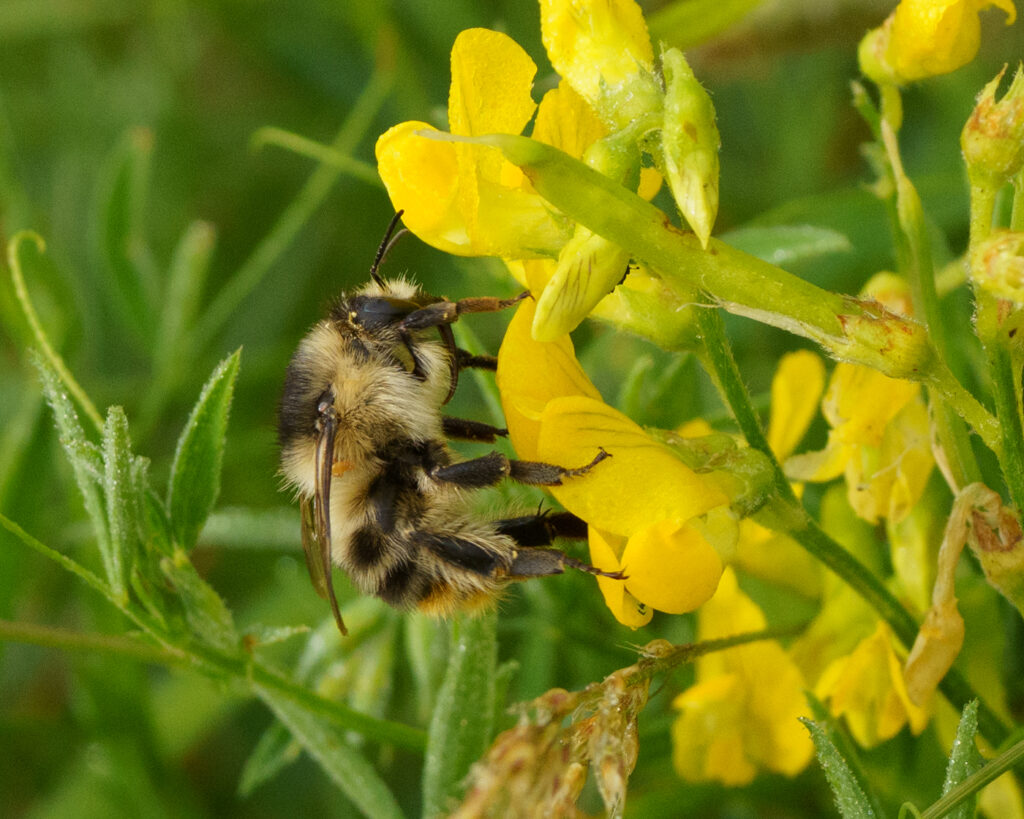A RARE British bumblebee has been boosted with a chance of survival after a successul conservation effort received an award.
The shrill carder bee – one of the UK’s rarest bumblebees – has seen its survival chances boosted as conservation techniques see Woodland Trust site given special “champion status” for the species.
The trust has earned this through their work in conservation techniques at Victory Wood, Kent.

The bee (Bombus sylvarum), named because of its characteristic high-pitched buzz, has – like many bumblebees seen its population crash over the last 80 years.
When Victory Wood, Kent, was bought by the Woodland Trust back in 2004 it was almost entirely arable farmland.
Since then, the 140 hectare site has gone through many changes to boost biodiversity and now consists of a mixture of woodland, scrub and grassland.
Four years ago the bumblebee was discovered at the site, and the Woodland Trust teamed up with the Bumblebee Conservation Trust and recruited a host of volunteers to safeguard the future of the species.
Surveys indicate that the population has risen significantly – with the highest number of 121 individuals recorded on one particular day.
Now, the Bumblebee Conservation Trust has announced the site in Yorkletts, Whitstable a Champion Site for the rare bee.
Dr Hazel Jackson, Head of Conservation Outcomes and Evidence at the Woodland Trust, said: “We are so pleased and excited that Victory Wood has been recognised as a champion site for the shrill carder bee – it’s a real conservation success story and a great example of nature recovery.
“Since the amazing discovery of the bumblebee on site, we have been working closely with Bumblebee Conservation Trust to monitor and strengthen the shrill carder bee population.
“We have also provided specialist training for volunteers and local residents in both identification and bee survey techniques.
“It really does show how restoring nature to a site can boost biodiversity and aid our fight against climate change.”
The shrill carder bee is a priority species in England and Wales following significant declines since the 1950s.
The Bumblebee Conservation Trust leads on a number of projects to focus on the population of this rare bumblebee by creating a flower-rich habitat, including Red Bartsia – one of the ahrill carder bee’s favourite plants.
Daisy Headley, Shrill Carder Bee Species Recovery Manager at the Bumblebee Conservation Trust said: “We are really excited to announce Victory Wood as a Champion site for the shrill carder bee.
“We started designating champion sites to celebrate the exemplary work that sites are doing for our rare and scare bumblebees.
“Victory Wood, since its discovery, have gone above and beyond.
“Not only managing the site sympathetically to provide forage and nesting habitat for this bumblebee, they have also aided in the monitoring of the population and promoting its story to those visiting the site.
“Hard work like this deserves to be recognised and we hope that other sites can look to Victory Wood for inspiration!”
Victory Wood is part of the Wilder Blean complex, one of the largest ancient wooded landscapes in south-east England and provides important habitat for local wildlife.
The ahrill carder bee is one of the UK’s two rarest bumblebee species, the other is the Great Yellow bumblebee, which is now confined to a handful of populations in coastal Scotland.
Bumblebees are fantastic pollinators, important not only for helping wildflowers reproduce, but play a big role in producing the food we eat, from tomatoes to apples, peas and strawberries.